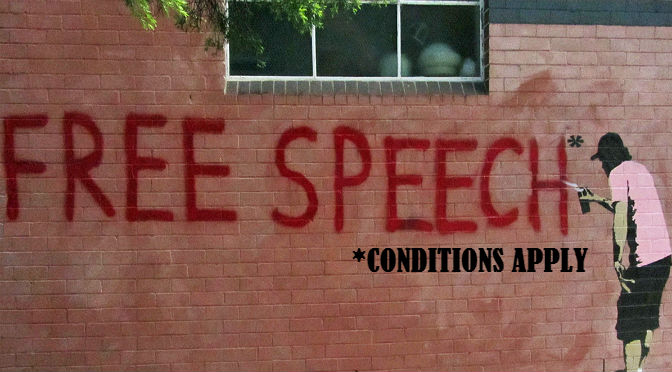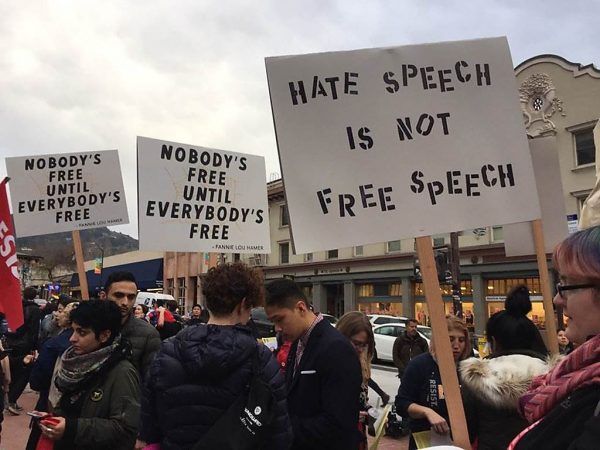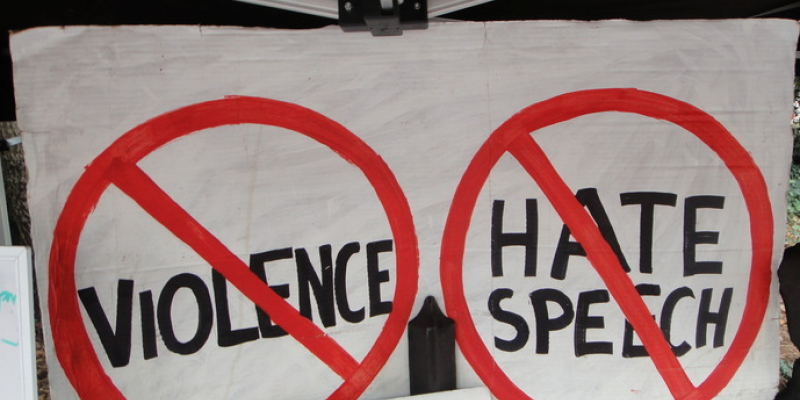Anti-discrimination regulations are their own kind of soulcraft.
Shall We Overcome the Hate Speech Movement?

It’s time for a counter-revolution in moral rhetoric.
Last fall, I moderated a debate between Democratic and Republican legislators on diversity and inclusion policies at Boise State University, my home institution. My questions aimed to make legislators explain their choice between the Old University of rational inquiry and the New Social Justice University.
I asked a question (at the 24:00 mark in the video) about hate speech legislation with an early draft of my friend Arthur Milikh’s hate speech report in mind:
When marginalized groups hear speech that offends their self-image, they call that hate speech. Such hate speech cases [allegedly] cause physical and emotional trauma for the victims. The more the exposure to hateful or hurtful ideas happens, even if those ideas are true, the sicker the people become. Given this, European countries and Canada have criminalized hate speech in one way or another. Does the respect for marginalized groups and their self-image demand anti-hate speech laws? Why? Or why not?”
Answers revealed much about both sides.
The Democratic legislators sang a lullaby about America having a First Amendment that makes hate speech laws unconstitutional. They added that all decent human beings should oppose hateful speech and homophobia and racism because of the effects on marginalized groups.
The very decent Republicans then noted that though they too oppose hateful, hurtful words, they also support free speech.
Here we are in a nutshell. Hate speech regulation is an essential tool in the identity politics regime. Such regulation shields supposedly disadvantaged or marginalized minority groups from being exposed to words that hurt or harm. Democrats and advocates of identity politics have every incentive to hide these radical implications of hate speech laws.
Today’s Republicans came of age, politically, when budgets, regulation, and, for some, affirmative action defined the political agenda. Not much in the conservative movement prepared them to oppose hate speech laws or such identity politics. They sense the stakes but are befuddled about how to respond without getting eaten alive.
Opponents of hate speech regulation face a complicated situation. Identitarians proceed along these lines: All agree that decent people should not use hateful language like the n-word, right? With that point gained, it is but a short step to the next: since decent people do not speak hatefully, anti-hate speech laws only truly threaten disrespectable people. It’s no threat to nice people. The offended will determine what is and what is not hateful.
Then we are off to the races of social transformation, because the elimination of self-perceived harms is essential to modern identity. What begins as a moral platitude ends up putting the self-image of the supposedly marginalized beyond criticism and requiring that the dominant group’s words serve that self-image.
In effect, anti-hate speech arguments are variations on the theme of “words hurt.” Sometimes allegedly hateful words are said to cause actual physical or psychological harm or to dispirit the harmed from participating in politics. Sometimes they are said to be the first steps down the road to genocide. Sometimes they are said to assault an individual’s dignity or rob them of self-respect. Studies will be trotted out to prove the relation between “hurtful words” and “harm” to marginalized identities.
Milikh’s most valuable service is to explain just what is going on here. His report first provides definitive responses to all small-ball claims that hate speech harms: he shows clearly that those who would oppose hate speech laws should have a good conscience in doing so. Maybe speech hurts, maybe it doesn’t, but speech is a necessary part of self-government. America cannot have it both ways: either we have free speech or we silence it for the sake of fragile identities.
Milikh goes further. Victims don’t really mean that they are harmed; they either want to rule their opponents or avenge themselves. Once people accept the seeming platitude that “words hurt,” then people alleging the hurt come, sooner or later, to exercise a “new tyranny over the mind”—in particular, over the perceived oppressor group’s mind.
Not all anti-hate speech advocates are self-consciously tyrants. Jeremy Waldron seems to believe that words hurt, but he thinks words can hurt whites and blacks, heterosexuals and homosexuals, Muslims and Christians alike. For more radical speech restrictionists, whose views seem to be winning the day, last generation’s liberals like Waldron fail to see that the harm done to the self-respect of marginalized groups is different in kind than violent, hateful words spoken by the marginalized groups to the oppressor group.
But in the last analysis, Waldron and his more radical comrades all demand protection from harmful speech in the name of a new and quite incoherent understanding of dignity. This view of dignity is at once infinitely valuable and independent (since it is grounded in self-creation) and infinitely brittle and dependent (since it requires the good opinion of others to succeed). The ostensibly marginalized parties cannot enjoy their identity if people utter speech that questions it. If this is a true assessment of the meaning of dignity, are people really that dignified?
While the incoherence of this view is no small theoretical problem, its purveyors are not much troubled by it. They use this framework to shame advocates of self-government and rational speech into submitting to their rule. It fosters a new form of fanaticism incompatible with the principles of civilization—especially our civilization.
For identity politics, language is power, and their critical language empowers them and dis-empowers their enemies. Extending intellectual charity to them (as decent, fair-minded people and scholars are wont to do) and refuting and taking their reasons with the ultimate seriousness means ceding territory to them, if not ceding victory to them. If language is only about power and not about giving an account of the world, then all rule is merely imposition.
Constitutional government cannot survive such an assault on rational dialogue. No genuine political unity can exist between those taken with the hate speech mentality and those who reject it.
As James Lindsay writes in New Discourses, “these ideas, ways of thinking, and subverted meanings of our words are out in the wild now” and cannot be wished away. The question is not only whether that spirit deserves censure (it does), but also what, in the name of God, shall we do with it?
Milikh’s most obvious deliverance is against complacent reliance on the Supreme Court’s First Amendment jurisprudence. Such floodgates have given way before and will give way again if they are not manned and supported in public opinion. We must reverse trends in public opinion away from support for this venerable American position, always keeping in mind the reason for First Amendment freedom is grounded the idea that our words are intended to reflect reality, not to impose power.
This points to a deeper question of practice. I was thrown back on my heels when students and colleagues said I had “blood” on my hands because of a blog post. How should the Republican legislator or a random college professor react when confronted with “words hurt” or with a variation on its theme?
Opponents of this new politics of hate speech must start by devising new clichés to displace its tyrannical platitudes. The new clichés must recognize the difficulty of being accused of hurting others. These clichés should be tailored to a variety of brains who may not understand the nuances of the issue. These are necessary to buoy confidence and conscience of those who would oppose the hate speech movement.
Milikh’s report points toward a new conservatism, awake to the new challenges of the identity politics Left and the need for a new public rhetoric to combat it. More work remains to be done.
The American Mind presents a range of perspectives. Views are writers’ own and do not necessarily represent those of The Claremont Institute.
The American Mind is a publication of the Claremont Institute, a non-profit 501(c)(3) organization, dedicated to restoring the principles of the American Founding to their rightful, preeminent authority in our national life. Interested in supporting our work? Gifts to the Claremont Institute are tax-deductible.
The securitization of so-called hate speech.
Conservatives and liberals alike let them do it.
A call to action.




